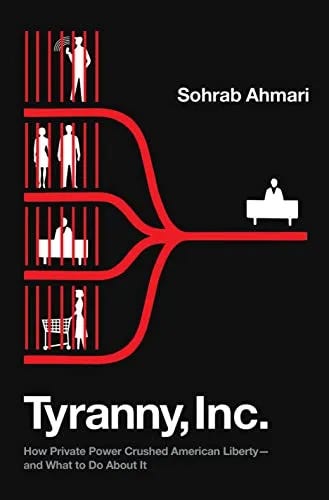Last week, a musician by the name of Oliver Anthony went viral on YouTube with a song called ‘Rich Men North of Richmond’. As of this writing, the YouTube link below has over 10 million views and has generated 52,000 comments, nearly all of them praising this song, and many sharing how deeply it spoke to their own economic and working life struggles.
Listening to this spare and beautiful howl against our current state of affairs, I wonder if Mr Anthony has been reading this Substack, given that he directly addresses many of the same issues I do.
”I’ve been selling my soul, working overtime hours for bullshit pay.” might as well be about many truckers in America, who are exempted from the overtime pay all other workers are entitled to, and who work 50% more hours than just about everybody else.
”Lord knows they all just wanna have total control
Wanna know what you think
Wanna know what you do”
Surveillance of the working class?
Controlling your speech and what you can think?
A track Mr Anthony posted to YouTube a few months ago contains yet more searing indictments of the contradictions and hypocrisies of America in 2023 -
”People’s cryin’ ‘bout burning’ coal, but not the poor souls who’s a diggin’ it
I reckon there’s been many good men in the grave tryin’ to keep our houses lit
And down in the oil fields, the pipelines, linemen, and the coal mines,
so we can sit at home and plug in a newfangled bullshit.
And Republicans and Democrats, I swear they’re all just full of crap.”
The Lord works in mysterious ways, for this week a new book by one of the founders of Compact Magazine (for whom I have written two articles and am awaiting publication of a third) is being released; a book which speaks to the very systems which undergird the problems for workers (and nearly everyone else) of which Mr Anthony sings.
Tyranny, Inc. by Sohrab Ahmari is a deep dive into how we came to be ruled by an unaccountable corporatocracy, and is as relevant as ever under the blurring of lines between corporate and state power which have accelerated greatly under the Covid Regime.
The blurb from Penguin Random House -
”Over the past two generations, U.S. leaders deregulated big business on the faith that it would yield a better economy and a freer society. But the opposite happened. Americans lost stable, well-paying jobs, Wall Street dominated industry to the detriment of the middle class and local communities, and corporations began to subject us to total surveillance, even dictating what we are, and aren’t, allowed to think. The corporate titans and mega-donors who aligned themselves with this vision knew exactly what they were getting: perfect conditions for what Sohrab Ahmari calls “private tyranny”.
Drawing on original reporting and a growing chorus of experts who are sounding the alarm, Ahmari chronicles how private tyranny has eroded America’s productive economy and the liberties we take for granted—from employment agreements that gag whistleblowers, to Big Finance’s takeover of local fire departments, to the rigging of corporate bankruptcy to deny justice to workers and consumers—illuminating how these and other developments have left millions feeling that our livelihoods are insecure. And he shows how ordinary Americans can fight back, by restoring the economic democracy that empowered and uplifted millions of working-class people in the twentieth century.”
Ahmari’s book takes us on a zoomed out look at the systems in America which have developed to throw the advantage to all of those ‘Rich Men North of Richmond’, and have left regular working people more precarious than ever.
Many examples used in the book are very relevant and of the times; Ahmari examines the enrichment of the guilty parties of the Opioid Epidemic, the Sackler Family of Purdue Pharma fame, and of the legal tricks used by Johnson + Johnson to avoid liability for their products, something of considerable concern for those who succumbed to the relentless Psychological Warfare unleashed on the world by the Covid Regime.
Financialization of the economy and the role of private equity are interrogated, and how companies like Sears, once marquee names across the land, were gutted for all they were worth. A trend familiar to truckers like myself is the consolidation of players in our industry as a result of various income funds and other investment vehicles taking over what were once family run businesses, yet another effect of financialization.
Ahmari also spends time critiquing the Paul Ryans of the world, and the trends of laissez-faire capitalism, from the enclosure of industrial revolution England to the railroaders of 19th century America, and the policies of those who tried to reign the excesses in, such as those employed by the New Deal under FDR.
Something Ahmari touches on throughout the book, both in looking through history and up to our current times, is economic class, a subject which many in America would rather ignore. Given that the concerns of many parts of the working class are dismissed by our elite institutions, it’s no accident that outlets like Rolling Stone have reviewed “Rich Men North of Richmond” with the shallow Thought Terminating Clichés so often employed to ignore deeper economic problems. I’m giving those clowns no clicks, you can find it if you want; I wonder what they will have to say about Tyranny, Inc., if anything at all.
In my own political and philosophical journey, I have been all over the place, including spending a lot of time in Libertarian World. A problem many in that space have, and certain conservatives are guilty of this as well, is that they believe their own bullshit about the existence of ‘the free market’, and that we have all of these choices we can use to avoid the many situations Ahmari highlights in Tyranny, Inc. But that is not the reality we live in; rather, we are trapped in a corporatocracy where the government is more or less captured by massive business interests, many of them well funded and antagonistic to the liberties we like to pretend still exist. The largest and most powerful of said interests, such as Big Tech, are under the sway of ‘progressive’ ideologies like identity politics, which are actively antagonistic to the normal working class people of the world whom Oliver Anthony’s music speaks to; Rainbow Flags assigned great import as a distractionary measure from holding people like The Sacklers, or our entire political class, accountable for the wreckage they have wrought on many parts of the country.
Tyranny, Inc. is a welcome addition to the discussion, and offers some useful course correction in how to think about the role of the government and supposedly ‘private’ actors in our marketplace, and what to do about the nearly unaccountable power they hold over society in 2023.





This pulls at an anti-institutional thread in me. Our day has revealed the corruption, big and small, of every single institution. The problems seem insurmountable because you need institutions (or the promise of institutional reform) to address them. But it all hope in institutions wanes? A challenge indeed.